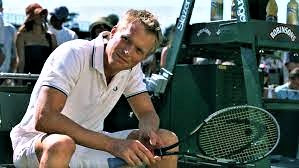 |
| ...playing without balls... |
TENNIS ANYONE?
American romantic comedy has the screwball tradition; men behaving badly and love thriving on eccentricity, duplicity, even criminality. In Europe, tricksters dazzle and charm the opposite sex; intelligence and audacity rule. Almost alone, Britain celebrates the loser lover. From The Importance of Being Earnest and Kind Hearts and Coronets to Notting Hill, its stories are of romantic failure bravely borne.
True to type, Richard Loncraine’s Wimbledon (2004), a rare example of a romcom with a setting in sports, places its love story in the very heart of competitive Britain, the world of professional tennis, and makes its main character an accident about to happen.
“Put three Germans together,” joked that vigorous proponent of European union, Hermann Göring, “and you have a war. Three Russians, and you have a revolution. Three Englishmen, and you have... a club!” – an object, it should be remembered, once defined as “a dull, heavy thing, with no point.”
In Wimbledon, the entity in question is the All England Lawn Tennis and Croquet Club, which manages the world’s pre-eminent grass-court tournament. With the 2021 event about to engulf us in a tsunami of physical excellence, hype, ego, greed and rain-outs, garnished with strawberries and cream, the film is given new relevance by Naomi Osaka’s recent cri de coeur against the post-event pressures of the big-time game, and in particular its journalists.
 |
| Peter Colt (Paul Bettany) faces failure |
Failing British champ Peter Colt (Paul Bettany), once eleventh-best in the world, is about to play in what he expects to be his final tournament before being put out to grass (though more like stood at stud) as resident pro in an up-market country club, fresh meat for its rapacious matrons. However, a “wild card” invitation to participate in the tournament, combined with meeting and sleeping with rising American star Lizzie Bradbury (Kirsten Dunst), catapults him into a dazzling example of what time-and-motion experts call the End Spurt.
Richard Loncraine’s films are so various that he was a natural choice for so unconventional a tale. A former sculptor, he set his modern dress Richard III in a Britain between the wars, ingeniously exploiting the Brutalism of London’s industrial architecture, but was equally at home in the fussiness of Victorian England for The Missionary, a ribald comedy with Michael Palin as the innocent divine sent to save the souls of London’s prostitutes.
There’s neither Brutalism nor ribaldry in Wimbledon, nor, for that matter, any hint of Naomi Osaka’s anguish. The press are subdued, respectful, and no more than customarily intrusive, appropriate to the film’s discreet setting in the Home Counties, and to the fancied gentility of the sport. Colt’s parents (Eleanor Bron and Bernard Hill) inhabit a ramshackle country mansion, while he drives an albeit battered Porsche and keeps a convincingly untidy apartment on the front at Brighton. Nor does the film fail to exploit a tradition that competitors stay at the luxury Dorchester Hotel, overlooking Hyde Park. In British romcoms, snobbery comes with the territory.
Since it’s implicit that, as Oscar Wilde remarked, “the very essence of romance is uncertainty,” various impediments to the affair must be overcome, among them Lizzie’s father (Sam Neill), fixated on her winning, and Jake Hammond (Austin Nichols), her boorish former lover and Peter’s most formidable opponent on the court, not to mention Peter’s parents, long inured to his under-achievement, and a younger brother (James McAvoy) who finds his losses a reliable source of income at the betting shop.
 |
| James McAvoy |
Chris Evert and John McEnroe, playing themselves as commentators, further contribute to his expectation of failure by unhelpfully reviewing Britain’s dismal history of would-be champions who pulled up lame, as they confidently expect Colt to do. (Screenwriters Adam Brooks, and husband and wife team Jennifer Flackett and Mark Levin obviously drew on Evert’s marriage to British star John Lloyd, just as Jake Hammond shares some characteristics with her former lover, the belligerent Jimmy Connors.)
True to type, Colt is as fumbling in the bedroom as on the court, walking in on Lizzie in the shower, climbing into her window at night and waking the house, spiriting her away to the seaside, only to have his brother blow their whereabouts to the press. When she blames him for her own loss in the tournament, he revives their relationship with a glum TV interview in which he apologises for having in some unspecified way “let her down”. Never mind that he hasn’t done anything wrong. His abasement charms her, as Julia Roberts is charmed in Notting Hill by Hugh Grant’s appearance at her press conference.
 |
| In Brighton (Paul Bettany, Kirsten Dunst) |
Fortunately, Paul Bettany is well supplied with charm. This saves the day, as it does in most British comedies, and diminishes, without entirely neutralising the wince factor of many scenes, particularly a contrived envoi with Peter, Lizzie and their kids as the First Family of Tennis.
Unfortunately, he and Dunst share no chemistry at all. As with Hugh Grant and Julia Roberts in Notting Hill, the sex is Understood. (Think of the spark between Roberts and Richard Gere in Pretty Woman. In comparison, she and Grant barely raise a glimmer.) We are asked to take on trust thatpassion flared during soft-focus walks in the rain and post-coital suppers of fish and chips eaten out of newspaper on the balcony of London’s most exclusive hotel. That’s the difference between romcoms and real life. All we get is wet feet and grease spots. Incidentally, for greater ease of acting, the film’s tennis matches were played without balls. I think this speaks for itself.
No comments:
Post a Comment
Note: only a member of this blog may post a comment.